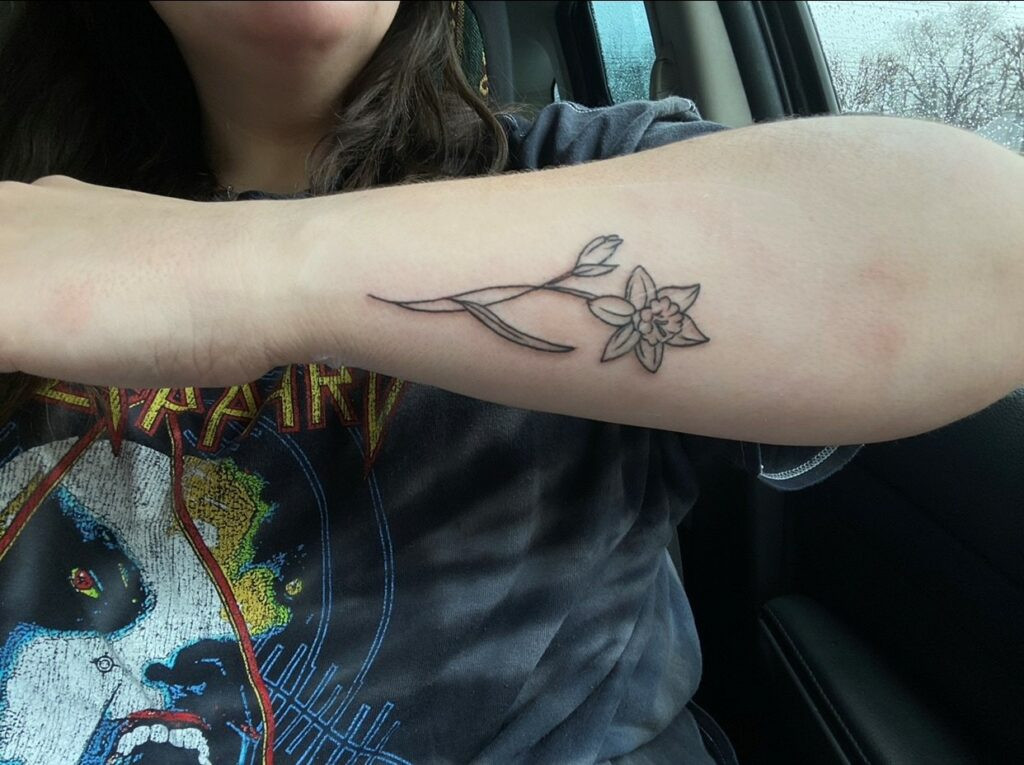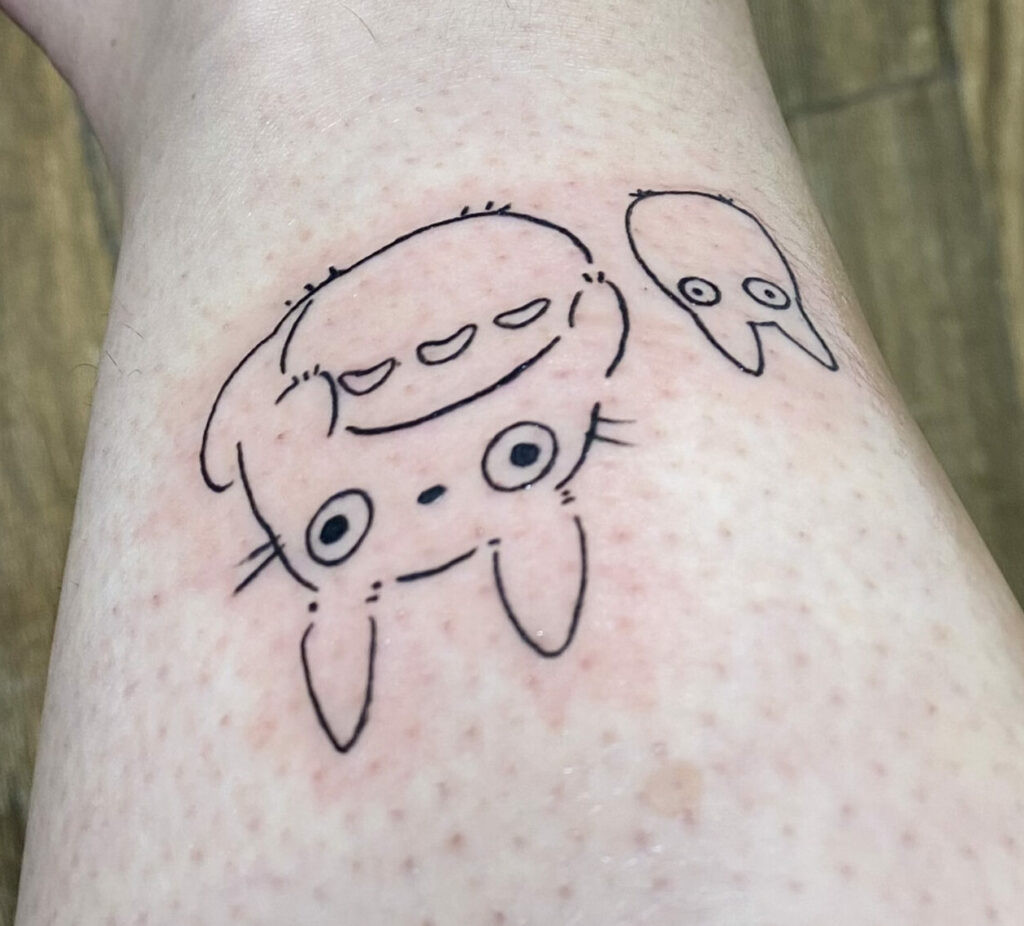Thinking about getting inked but have eczema? It’s a common question, and at tattooat.com, we’re here to guide you through it. Getting a tattoo with eczema requires careful consideration and precautions to ensure a safe and positive experience. We will explore the potential risks, necessary precautions, and expert recommendations for individuals with eczema who are considering tattoos, also, we will discuss how to choose the right tattoo artist, aftercare tips, and real-life experiences, providing you with everything you need to make an informed decision.
1. Understanding Eczema and Its Impact on Tattooing
1.1 What is Eczema?
Eczema, also known as atopic dermatitis, is a chronic inflammatory skin condition characterized by dry, itchy, and inflamed skin. It affects millions worldwide, with varying degrees of severity. According to the National Eczema Association, eczema can flare up due to various triggers, including allergens, irritants, stress, and changes in weather.
1.2 How Eczema Affects the Skin’s Tattooability
Eczema can significantly impact the skin’s suitability for tattooing. The skin barrier is compromised during flare-ups, making it more susceptible to irritation and infection.
- Increased Sensitivity: Eczema-affected skin tends to be more sensitive.
- Risk of Flare-Ups: The tattooing process can trigger flare-ups.
- Impaired Healing: Eczema can slow down the healing process.
- Infection Risk: Broken skin is more prone to infections.
- Allergic Reactions: There’s a higher chance of reacting to tattoo inks.
These factors highlight the need for careful evaluation and precautions before getting a tattoo.
1.3 Factors to Consider Before Getting a Tattoo
Before deciding to get a tattoo, individuals with eczema should consider several crucial factors to minimize risks and ensure the best possible outcome. These include:
- Severity of Eczema: Assess how severe and frequent your eczema flare-ups are. If your eczema is well-managed and infrequent, you may be a better candidate.
- Location of Eczema: Consider where eczema typically occurs on your body. Avoid tattooing areas prone to flare-ups.
- Triggers: Identify and avoid triggers that exacerbate your eczema, such as certain fabrics, soaps, or environmental factors.
- Medications: Some medications, like isotretinoin (Accutane), can impair healing and increase the risk of complications.
- Consultation with Professionals: Consult both a dermatologist and a tattoo artist experienced in working with sensitive skin.
Understanding these factors will help you make an informed decision about whether getting a tattoo is right for you.
2. Key Considerations and Precautions
2.1 Consulting with a Dermatologist
Seeking advice from a dermatologist before getting a tattoo is paramount for individuals with eczema. A dermatologist can assess your skin’s condition, provide personalized recommendations, and identify potential risks.
- Skin Assessment: Evaluate the severity and stability of your eczema.
- Medication Review: Assess any medications you’re taking.
- Allergy Testing: Recommend allergy testing for tattoo inks.
- Personalized Advice: Give tailored advice based on your skin.
- Emergency Plan: Create a plan for flare-ups or reactions.
2.2 Choosing the Right Tattoo Artist
Selecting an experienced tattoo artist is crucial for a safe and successful tattoo experience, especially for individuals with eczema.
- Experience with Sensitive Skin: Look for an artist who has worked with sensitive skin.
- Portfolio Review: Review the artist’s portfolio for healed tattoos.
- Hygiene Standards: Ensure the studio follows strict hygiene practices.
- Consultation: Schedule a consultation to discuss your eczema.
- Patch Testing: Ask about patch testing inks before the tattoo.
2.3 Understanding Tattoo Inks and Allergies
Tattoo inks can cause allergic reactions, particularly in individuals with eczema. It’s essential to understand the types of inks and potential allergens.
- Types of Inks: Learn about different ink compositions.
- Common Allergens: Be aware of common allergens in tattoo inks.
- Patch Testing: Insist on a patch test before getting the tattoo.
- Hypoallergenic Options: Inquire about hypoallergenic inks.
- Black Ink: While black ink may be less likely to cause reactions, consult with your dermatologist and tattoo artist.
2.4 Importance of a Patch Test
A patch test is a crucial step in determining how your skin will react to the tattoo ink.
- Small Dot Tattoo: Get a small dot tattooed with the desired ink.
- Monitor for Reaction: Watch for redness, itching, or swelling.
- Wait Period: Wait at least a week to assess the reaction.
- Dermatologist Review: Have your dermatologist review the patch test.
- Informed Decision: Make an informed decision based on results.
2.5 Optimal Timing for Tattooing
Timing is crucial when getting a tattoo with eczema. The best time to get a tattoo is when your eczema is well-controlled.
- Flare-Free Skin: Ensure the tattoo area is eczema-free for months.
- Stable Condition: Get tattooed when your skin is stable.
- Avoid Triggers: Avoid potential eczema triggers before the tattoo.
- Hydrate: Stay hydrated.
- Healthy Diet: Eat a balanced diet.
3. The Tattooing Process: Step-by-Step Guide
3.1 Pre-Tattoo Preparation
Proper preparation before your tattoo appointment is essential.
- Hydrate Well: Drink plenty of water.
- Avoid Alcohol: Don’t drink alcohol before.
- Good Sleep: Get good sleep.
- Moisturize: Keep the skin moisturized.
- Avoid Sunburn: Protect from sunburn.
3.2 During the Tattoo Session
Communicate openly with your tattoo artist during the session.
- Communicate Sensations: Immediately inform if you feel pain.
- Breaks: Take breaks if needed.
- Monitor Skin: Watch for redness or swelling.
- Stay Calm: Try to stay relaxed.
- Follow Instructions: Adhere to artist’s advice.
3.3 Aftercare Essentials
Proper aftercare is crucial to prevent infections and promote healing.
- Keep it Clean: Gently clean the tattoo.
- Moisturize: Apply a fragrance-free moisturizer.
- Avoid Scratching: Don’t scratch the tattoo.
- Stay Hydrated: Keep the area hydrated.
- Loose Clothing: Wear loose clothing.
3.4 Dealing with Potential Flare-Ups
Even with precautions, flare-ups can occur.
- Identify Triggers: Determine what caused the flare-up.
- Gentle Cleansing: Clean the area gently.
- Moisturize: Apply moisturizer frequently.
- Topical Steroids: Use prescribed topical steroids.
- Consult Dermatologist: Seek advice.
4. Real-Life Experiences and Testimonials
4.1 Positive Tattoo Stories from People with Eczema
Many individuals with eczema have had positive tattoo experiences.
- Alexis Smith: Moderate-to-severe eczema, loves having art on her body.
- Skyler Winfield: Gained confidence from tattoos, overshadowing her eczema.
- Zoe McReynolds: Improved self-esteem.
These stories highlight the potential for positive outcomes when precautions are taken.
4.2 Challenges and How to Overcome Them
Some people with eczema face challenges with tattoos.
- Alyssa Elizabeth: Experienced skin irritation around the tattoo.
- Zoe McReynolds: Had issues with ink settling.
Overcoming these challenges requires careful planning and communication.
4.3 Expert Opinions
- Dr. Peter Lio (Dermatologist): Advises against tattooing during flare-ups.
- Dr. Ari Zelig (Allergist): Cautions about dyes in tattoo inks.
- Lori Rowe (Tattoo Artist): Emphasizes caution and turning away clients with skin issues.
5. Aftercare: Ensuring Proper Healing and Maintenance
5.1 Immediate Aftercare
The first few days after getting a tattoo are critical for healing.
- Keep Bandaged: Leave the bandage on.
- Gentle Washing: Wash the area gently.
- Pat Dry: Pat the skin dry with a paper towel.
- Apply Ointment: Use a thin layer of petroleum jelly.
- Air Exposure: Allow the skin to air dry.
5.2 Long-Term Maintenance
Proper maintenance will keep your tattoo looking its best.
- Moisturize Daily: Moisturize the tattoo daily.
- Sun Protection: Protect the tattoo from the sun.
- Avoid Irritants: Avoid harsh soaps and lotions.
- Stay Hydrated: Drink plenty of water.
- Healthy Diet: Maintain a healthy diet.
5.3 Recognizing and Addressing Complications
Be vigilant for signs of complications.
- Infection Signs: Watch for redness, swelling, or pus.
- Allergic Reactions: Look for itching or rash.
- Scarring: Monitor for keloid formation.
- Delayed Healing: Address any delayed healing promptly.
- Consult Doctor: Seek professional medical advice.
6. Finding Inspiration and Design Ideas
6.1 Styles and Designs Suitable for Eczema-Prone Skin
Choosing the right tattoo style can minimize irritation.
- Minimalist Designs: Simple designs reduce skin trauma.
- Black Ink Only: Avoid colored inks.
- Larger Areas: Avoid dense, intricate designs.
- Placement: Avoid areas prone to flare-ups.
- Consult Artist: Discuss design options with your artist.
6.2 Placement Considerations
Choosing the right location can significantly impact comfort.
- Avoid Flare Zones: Stay away from typical eczema areas.
- Consider Skin Thickness: Opt for areas with thicker skin.
- Less Friction: Choose locations with less friction.
- Sun Exposure: Avoid high sun exposure.
- Personal Preference: Choose based on your body.
6.3 Showcasing Beautiful Tattoo Designs
Here are some beautiful tattoo designs suitable for eczema-prone skin.
 Minimalist tattoo design on wrist
Minimalist tattoo design on wrist
Alt text: A minimalist tattoo design on the wrist of a person with eczema, showcasing a simple yet elegant art form.
 Black ink floral tattoo on arm
Black ink floral tattoo on arm
Alt text: Black ink floral tattoo on arm
 Fine line tattoo on leg
Fine line tattoo on leg
Alt text: A fine line tattoo on a person’s leg, highlighting the delicate details and precise execution.
7. Expert Advice and Recommendations
7.1 Insights from Tattoo Artists Experienced with Eczema
Tattoo artists with eczema experience offer valuable insights.
- Communication: Openly discuss your skin.
- Patience: Be patient during the process.
- Customization: Customize the experience.
- Trust: Trust your artist’s expertise.
- Follow Instructions: Follow aftercare instructions.
7.2 Dermatologists’ Perspectives on Tattooing with Eczema
Dermatologists provide essential medical advice.
- Assess Skin: Evaluate your skin condition.
- Recommend Tests: Suggest allergy testing.
- Provide Guidance: Offer personalized guidance.
- Emergency Plan: Create a plan for complications.
- Monitor Healing: Monitor the healing process.
7.3 Allergists’ Recommendations for Safe Tattooing
Allergists focus on minimizing allergic reactions.
- Identify Allergens: Determine potential allergens.
- Patch Testing: Emphasize patch testing.
- Hypoallergenic Inks: Recommend hypoallergenic inks.
- Monitor Reactions: Watch for signs of allergic reactions.
- Emergency Treatment: Have treatment available.
8. Latest Trends and Innovations in Tattooing for Sensitive Skin
8.1 Advancements in Hypoallergenic Inks
The tattoo industry is continually evolving, with advancements in hypoallergenic inks designed to minimize allergic reactions. These inks are formulated to exclude common allergens and irritants, making them a safer option for individuals with sensitive skin and eczema.
- Pigment Encapsulation: Encapsulating pigments to prevent direct skin contact.
- Organic Pigments: Using organic, plant-based pigments.
- Reduced Metal Content: Minimizing heavy metals in inks.
- Third-Party Testing: Inks tested and certified by independent labs.
- Transparent Formulations: Clear ingredient lists for informed decisions.
8.2 Techniques to Minimize Skin Trauma
Innovative tattooing techniques aim to reduce skin trauma, promoting faster healing and minimizing flare-ups. These methods focus on precision and gentleness to protect the skin barrier.
- Fine Needle Work: Using ultra-fine needles.
- Lower Voltage Machines: Machines with precise voltage control.
- Single-Pass Technique: Completing lines and shading with one pass.
- Even Pressure: Applying consistent, gentle pressure.
- Controlled Depth: Ensuring accurate ink deposit.
8.3 Innovations in Aftercare Products
New aftercare products are designed to soothe and protect sensitive skin, promoting optimal healing and reducing the risk of complications.
- Sterile Bandages: Breathable, sterile tattoo bandages.
- Antimicrobial Films: Transparent antimicrobial films.
- Soothing Balms: Natural ingredient balms.
- Hypoallergenic Cleansers: Gentle cleansers with soothing properties.
- UV Protection: Moisturizers with built-in sun protection.
9. FAQ: Addressing Common Concerns
9.1 Can I get a tattoo if my eczema is mild?
Yes, if your eczema is mild and well-managed, you can consider getting a tattoo. Consult with your dermatologist and choose a tattoo artist experienced in working with sensitive skin.
9.2 What type of tattoo ink is safest for eczema?
Hypoallergenic inks are generally the safest option for eczema. Look for inks with minimal allergens and organic pigments.
9.3 How long should I wait after a flare-up to get a tattoo?
Wait several months after a flare-up to ensure the skin is fully healed and stable. Your dermatologist can provide a specific timeline based on your condition.
9.4 Can I use my regular eczema cream on a new tattoo?
No, avoid using your regular eczema cream on a new tattoo unless specifically advised by your dermatologist. Use fragrance-free, hypoallergenic moisturizers recommended by your tattoo artist.
9.5 What are the signs of an allergic reaction to tattoo ink?
Signs include itching, redness, swelling, rash, and blistering around the tattoo. Seek medical attention immediately if you experience these symptoms.
9.6 Will a tattoo make my eczema worse?
It might trigger flare-ups, especially if the tattoo area is prone to eczema. Proper planning and precautions can minimize this risk.
9.7 Should I avoid certain tattoo placements if I have eczema?
Yes, avoid areas where eczema commonly occurs, such as the elbows, knees, and neck. Choose locations with thicker skin and less friction.
9.8 Can I get laser tattoo removal if I have eczema?
Laser tattoo removal may be possible, but it can also trigger flare-ups. Consult with your dermatologist to assess the risks and benefits.
9.9 What should I do if my tattoo gets infected?
If your tattoo shows signs of infection, such as pus, increased pain, or fever, seek medical attention immediately. Your doctor may prescribe antibiotics to treat the infection.
9.10 Can I donate blood after getting a tattoo if I have eczema?
Yes, you can donate blood after getting a tattoo, but you typically need to wait a certain period (usually 3-6 months) to ensure there are no infections or complications. Check with your local blood donation center for specific guidelines.
10. Conclusion: Making an Informed Decision
Getting a tattoo with eczema requires careful planning and precautions. By consulting with professionals, choosing the right artist, understanding tattoo inks, and following proper aftercare, you can minimize risks and achieve a beautiful tattoo. Remember to prioritize your skin’s health and make an informed decision that aligns with your well-being.
Ready to explore tattoo designs and find a skilled artist? Visit tattooat.com for inspiration, resources, and expert guidance to make your tattoo journey a success. Discover unique tattoo ideas, connect with talented artists, and learn essential tattoo knowledge to bring your vision to life.
Address: 1825 SW Broadway, Portland, OR 97201, United States
Phone: +1 (503) 725-3000
Website: tattooat.com